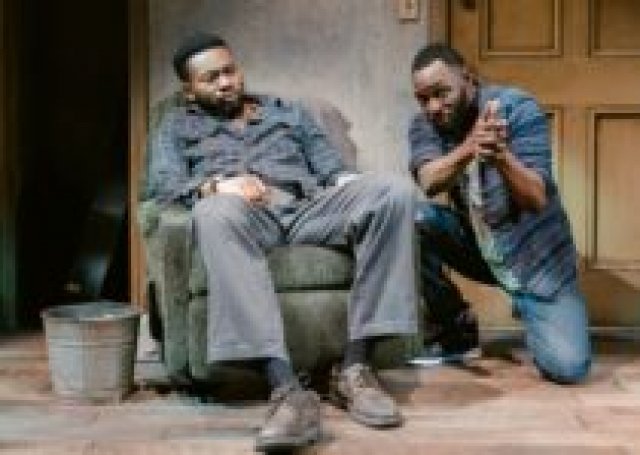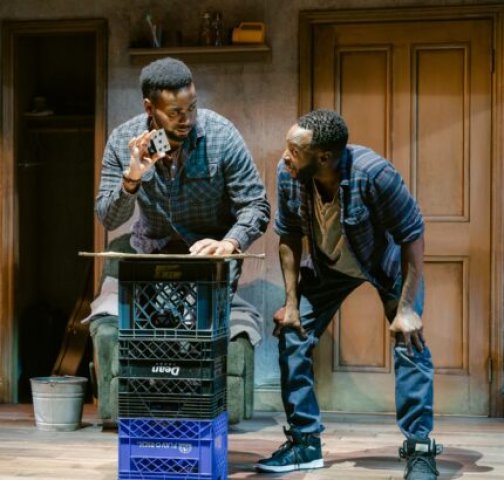Topdog/Underdog
Pulitzer Prize-winning Play at Palm Beach Dramaworks
By: Aaron Krause - May 30, 2023
If a prize existed for malicious jokes, you would have to nominate the father of the young men portrayed in Suzan-Lori Parks’ engrossing, darkly comic, bold, and tragic play, Topdog/Underdog.
In particular, as his idea of a cruel joke, dad (whom we never see) named his two African American sons Lincoln and Booth.
For those not up on history, a brief refresher is in order. Actor John Wilkes Booth assassinated Abraham Lincoln, the nation’s 16th president, on April 15, 1865. Booth shot Lincoln as the president watched a play at Ford’s Theatre in Washington D.C. Apparently, as a motive, Booth believed that southerners could restore the Confederacy — and Lincoln posed a major obstacle to accomplishing that task.
In the present day-set, poetic, and unflinching Pulitzer Prize-winning Topdog/Underdog, naming his children Lincoln and Booth was hardly their father’s only sin. In addition, he and his wife abandoned their sons when they were 11 and 16. All they left their boys was $500 each. But just as we are about to denigrate the parents, we learn that their pursuit of the American Dream may have come up short.
Lost young men
In the complex yet accessible, richly symbolic, and riveting Topdog/Underdog, which Palm Beach Dramaworks (PBD) is presenting in a praiseworthy production through June 11, we meet Lincoln and Booth in their 30s. The brothers, who barely scrape by, live together. Clearly, the American Dream has eluded this family since the young men were boys. They share Booth’s seedy and small boarding house room in an unnamed city.
Booth, the younger sibling, is a petty thief. In particular, he steals dressy clothes, among other items. Contrastingly, Lincoln works in an arcade. Specifically, he dresses in whiteface as his namesake and sits, pretending to watch a play as customers make believe they are assassinating him with cap guns. Hey, it’s an honest living, bringing in $314 a week. And, for purposes of Parks’ play, the job symbolizes how history, especially African American history, tends to repeat itself.
Booth wants Lincoln to teach him how to expertly operate the illegal con game three-card monte. In fact, Booth views it as the brothers’ ticket out of poverty. And, in a sign that he looks up to his older brother, Booth wants to partner with Lincoln to form such a con operation. However, Lincoln, who used to be an expert three-card monte dealer, has seen how deadly the game can turn. So, he opted for a more “legitimate” job.
Booth’s desire to be a three-card monte conman, and Lincoln’s hesitancy to return to that “job,” forms the main conflict in Topdog/Underdog, resulting in tense drama.
The tough and tender, insightful, and relatable piece’s title alludes to the competitive relationship between Lincoln and Booth. Indeed, in the play, each character vies for emotional, financial, and physical power over the other. Lincoln, who possesses a job and seemingly a better life, is the “topdog” to the petty thief Booth’s “underdog.”
Peeling away layers
At one point, Booth comes home wearing layers of clothing. To be specific, he is sporting fancy clothes he stole from a department store. Booth removes his clothes, one layer at a time, until he is clad in basic garments. This action is symbolic; Parks peels back layers from the characters as she reveals information that endear us to them. The playwright metaphorically unclothes the siblings, allowing us to see and hear them in their naked vulnerability as they bare their souls through dialogue and monologues.
While Parks does not pretend to condone the brothers’ behavior or their living situation, she shows us their positive qualities and their undesirable attributes. Also, you have to take into account the brothers’ painful past before judging them. Parks alternately makes us admire them and wish to scold them. For instance, it is easy to respect Booth’s admiration of his older brother and his desire for a significant other in his life. But as we grow close to the character, we find ourselves silently discouraging Booth as he insists on running a three-card monte operation.
While Booth exhibits positive traits, so does Lincoln. Namely, the latter seems smart, polished, and willing to earn a living. Although we may disagree with Lincoln’s job choice, it is honest work. And Lincoln seems genuinely concerned when he hears rumors that management at the arcade is considering replacing him with a wax dummy. However, we might like to hear what he would do if his boss fires him. What would his plan be? Also, we may find ourselves silently discouraging Lincoln when he instructs his younger brother in the “fine art” of three card monte dealing. Of course, we may also look down on Lincoln as he fights with or belittles his younger brother.
You may recognize your own sibling, or someone you know, through Booth and Lincoln’s close yet fragile relationship. As is true with many relationships, Lincoln’s and Booth’s features moments of accord and discord. But beneath the acrimony and arguing, it ultimately becomes clear that these two complex individuals love each other.
The past haunts
In addition to tackling themes such as the failure of the American Dream, the choices we make, power, sibling rivalry, racism, poverty, deception, and masculinity, Topdog/Underdog points out that you cannot erase your past. Actually, it can haunt you. Despite Booth’s attempt to change his name (he wants people to call him “Three Card”), his real name stubbornly remains. And it foreshadows a grim future for both brothers. As Booth tries to perfect his three-card monte act, the play’s rising action increases in dramatic tension until it reaches an explosive climax… and a heart shattering conclusion.
Unquestionably, Topdog/Underdog is a great tragedy of the common man, a work as powerful as Arthur Miller’s Death of a Salesman and some of Shakespeare’s tragedies.
Powerful acting
Last September, the professional, Miami Lakes-based Main Street Players presented a powerful production of Topdog/Underdog featuring masterful acting, direction, and design.
Today, less than a year later, PBD’s production astonishes with its own top-notch elements on stage and behind the scenes.
For example, George Anthony Richardson, as Lincoln, and Jovon Jacobs, as Booth, are believable as brothers. This is true whether the pair are bickering, violent toward each other, or seemingly best friends.
Jacobs, with wide, dark eyes that seem to shoot daggers, leans forward as Booth, the more impulsive, intense sibling. The experienced, talented, and award-winning South Florida-based actor portrays Booth with a palpable desperation. It suggests a starved and trapped wild animal. He is unpredictable and seems liable to pounce any second.
While exhibiting such intensity, Jacobs never overacts. Instead, he makes all of Booth’s traits seem organic to the character. In addition to nervousness, desperation, fierce anger, sneakiness and impulsivity, such traits include a humble admiration for Lincoln, unbridled exuberance, and sexual energy.
Jacobs communicates with his entire body. And he uses his seemingly endless arsenal of vivid facial expressions and versatile voice to believably express his character’s emotions and feelings. Also, as an inexperienced three-card monte dealer, Jacobs makes Booth’s approach look and sound awkward and hesitant, yet energetic.
In a stark contrast to Jacobs’ restless, explosive Booth, Richardson lends Lincoln a seemingly satiated, understated demeanor. In addition, the actor makes Lincoln’s routine as a three-card monte dealer sound and look smooth and natural.
Richardson, a talented New York City-based actor and Julliard graduate, demonstrates an impressive naturalness as Lincoln. He stands tall and appears calm as well as content, with an easy laugh. Even so, Richardson conveys a convincing weariness as Lincoln. It suggests that the character is emotionally drained from the brothers’ living arrangement and lifestyle. However, when it comes time for Richardson to amp up the intensity of his performance, the actor succeeds admirably. He lends Lincoln a determined air and a forcefulness that suggests a passionate, proud man.
Behind the scenes work shines
Belinda “Be” Boyd, who expertly directed PBD’s production of Intimate Apparel last season, sensitively directs this production of Topdog/Underdog.
Boyd has helped the performers unearth the characters’ humanity, which always shines through. Also, to her credit, Boyd gives equal weight to the intense parts of the production and the more subdued, thoughtful scenes. In addition, under Boyd’s guidance, the production includes impactful pauses. During these moments, the actors communicate nonverbally as effectively as when they speak. A facial expression or gesture speaks volumes.
Behind the scenes, scenic designer Seth Howard’s narrow rendering of the boarding house room the brothers share could cause anyone to be claustrophobic. It includes details such as a “divider” that “separates” Booth’s half of the room from Lincoln’s. It is telling that the divider is barely long enough to hide Booth’s bed from Lincoln’s view. This family cannot even obtain adequate privacy.
Frankly, the room resembles a jail cell more than a residence. Outside the narrow windows, we can see what resembles falling snow, but this adds little to the production.
The set rests on a raised platform, one level higher than PBD’s actual stage. The set’s foundation looks like a combination of sand and stone. Somehow, it suggests that the set could crumble at any time. This, perhaps, symbolizes the brothers’ delicate relationship that could collapse at any moment.
While the program does not mention a projection designer, images of children appear, perhaps depicting the brothers as youngsters. At other times, larger versions of the brothers appear on the projection screen. Truthfully, the projections, like the “snow” outside, add little to the production.
Roger Arnold’s realistic sound design includes noises one might hear in any big city. The sound of sirens lends the production an ominous quality.
Kirk Bookman’s lighting design is appropriately realistic, while Brian O’Keeffe’s costumes clearly differentiate the two characters. Also, credit fight choreographer David A. Hyland for making physical struggles look real while keeping the actors safe.
A bold, imaginative playwright
Parks is the first African American woman to win the Pulitzer Prize for Drama. She is a prolific, multi award-winning, experimental playwright who is profoundly talented. Specifically, she uses uninhibited, imaginative and explosive language, and infuses her plays with original stage imagery, irreverence, and humor. Further, Parks’ work subverts theatrical convention, exhibits historical consciousness, provokes thought, and uses heightened language (less so in this play).
It is hard to categorize Parks’ work; she writes in many styles and uses varied characters and genres. Parks works with themes such as racism, sexism, sibling rivalry, poverty, gender roles, and history shaping the present.
No doubt, PBD’s excellent production of Topdog/Underdog would make Parks proud.
If you go
Palm Beach Dramaworks’ production of Topdog/Underdog continues through June 11 at its intimate theater space in West Palm Beach, 201 Clematis St. Performances are at 7:30 p.m. Wednesday, Thursday, and Sunday, as well as 2 p.m. Wednesday, Saturday, and Sunday. Running time is two hours and 40 minutes, including one intermission. Regular tickets cost $84. Student tickets are $15, and anyone under 40 pays $40 with a photo ID. Tickets for educators are half price with proper ID (other restrictions apply). Call (561) 514-4042, ext. 2 or go to palmbeachdramaworks.org.


